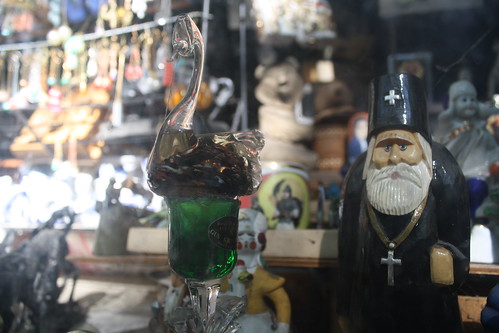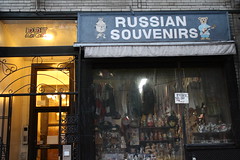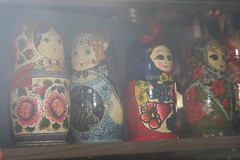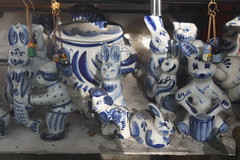East Village boutiques are pretty quirky, but Russian Souvenirs, a small consignment store on 14th Street near Third Avenue has some of the most unusual finds in the neighborhood.
The dust-crusted window leads to a view of a chaotic array of Matryoshka dolls, which includes one that’s painted to look like Michael Jackson. There’s a line of Soviet military caps adorned with red stars hanging from stretched-out wire hangers, and a collection of wooden statutes whittled to look like bears posing in odd positions. A hodgepodge of war medals, army pins, dangly gold earrings, glasses without lenses, and swaths of fabric — 50 percent off, as advertised on a rumpled piece of paper taped to the front of the store, — complete the window display.
The spectacle has been known to entice passersby.
“I saw this sort of messy stuff in the window and it was interesting,” said Catherine Siemann, a Chelsea resident, who stopped to take a peek.
Inside, Russian Souvenirs is a hoarder’s paradise. It is packed floor-to-ceiling with stuff; more nesting dolls and military paraphernalia, Ukrainian eggs, paintings of Soviet landscapes, racks of dark-colored clothing. The only aisle is too narrow for two people to stand side by side, and the place smells like a grandfather’s coat closet that hasn’t been opened for quite some time.
The shop has been around for 30 years, manned, the entire time by Alexander Bogatyr, a short, scruffy-faced man from St. Petersburg who speaks little English.
“I stay here and I work,” Mr. Bogatyr said. “Like a horse.”
He sells goods for people he knows in New York and overseas. Locals swear by the array and availability of certain hard-to-find items.
A woman who lives on 13th Street near Avenue A and only goes by her first name, Nechama, scoured the city for a Raggedy Andy Matryoshka doll for her nephew. “I found one on Amazon, but I thought I’d come here to see what else he had,” she said. “He’s got an amazing selection here.”
Mr. Bogatyr admitted sales are down, but said business is cyclical — “sometimes its up, sometimes it not,” — and that customers “come from God” (and most definitely not from media attention).
The elderly shopkeeper jokingly likened a visitor to a KGB agent and refused to answer any inquiries pertaining to his life, claiming that it “is not interesting.” When asked where he collects his wares Mr. Bogatyr quipped, “that’s too many questions, I’m sorry.” He keeps his shop locked — a sign instructs customers to knock — and opens the door with the chain still attached in a way that suggests he is leery of those who arrive.
“That’s his style,” said Chaim Yosef, who has owned Homeland Locksmith next door for 40 years. “That’s the way his life is. It’s not going to change.”
As mysterious as Mr. Bogatyr is, patrons consider Russian Souvenirs a very familiar touchstone of what the East Village was before gentrification. The store looks virtually the same now as it did when Mr. Bogatyr opened it in 1980 according to East Village residents — a constant in a neighborhood that refuses to stay frozen in time.
“I remember when my daughter moved here, there where other Russian stores on the other side of the street, but they closed,” said Angela Telles-Vaz, whose daughter lives in an apartment above the shop. “He is the one that remained.”
Mr. Yosef chuckled at his Russian friend’s “old-style” nature and called his lifestyle “primitive” because he doesn’t have a cash register or keep change. He said Mr. Bogatyr frequently pops over to his store and asks him to break big bills while customers wait outside. He also said the storeowner drives a hard bargain, referring to the time he believes Mr. Bogatyr overpriced a Russian doll he wanted to buy. He tried to convince Mr. Yosef it was worth $500 — “an antique,” he recalls Mr. Bogatyr telling him. He passed on the offer.
“But he is a very hardworking guy,” Mr. Yosef said with a smile.







